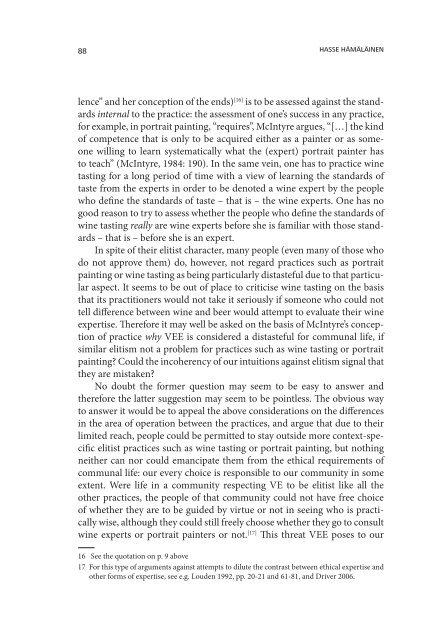Diacritica 25-2_Filosofia.indb - cehum - Universidade do Minho
Diacritica 25-2_Filosofia.indb - cehum - Universidade do Minho
Diacritica 25-2_Filosofia.indb - cehum - Universidade do Minho
Create successful ePaper yourself
Turn your PDF publications into a flip-book with our unique Google optimized e-Paper software.
88<br />
HASSE HÄMÄLÄINEN<br />
lence” and her conception of the ends) [16] is to be assessed against the standards<br />
internal to the practice: the assessment of one’s success in any practice,<br />
for example, in portrait painting, “requires”, McIntyre argues, “[…] the kind<br />
of competence that is only to be acquired either as a painter or as someone<br />
willing to learn systematically what the (expert) portrait painter has<br />
to teach” (McIntyre, 1984: 190). In the same vein, one has to practice wine<br />
tasting for a long period of time with a view of learning the standards of<br />
taste from the experts in order to be denoted a wine expert by the people<br />
who defi ne the standards of taste – that is – the wine experts. One has no<br />
good reason to try to assess whether the people who defi ne the standards of<br />
wine tasting really are wine experts before she is familiar with those standards<br />
– that is – before she is an expert.<br />
In spite of their elitist character, many people (even many of those who<br />
<strong>do</strong> not approve them) <strong>do</strong>, however, not regard practices such as portrait<br />
painting or wine tasting as being particularly distasteful due to that particular<br />
aspect. It seems to be out of place to criticise wine tasting on the basis<br />
that its practitioners would not take it seriously if someone who could not<br />
tell diff erence between wine and beer would attempt to evaluate their wine<br />
expertise. Th erefore it may well be asked on the basis of McIntyre’s conception<br />
of practice why VEE is considered a distasteful for communal life, if<br />
similar elitism not a problem for practices such as wine tasting or portrait<br />
painting? Could the incoherency of our intuitions against elitism signal that<br />
they are mistaken?<br />
No <strong>do</strong>ubt the former question may seem to be easy to answer and<br />
therefore the latter suggestion may seem to be pointless. Th e obvious way<br />
to answer it would be to appeal the above considerations on the diff erences<br />
in the area of operation between the practices, and argue that due to their<br />
limited reach, people could be permitted to stay outside more context-specifi<br />
c elitist practices such as wine tasting or portrait painting, but nothing<br />
neither can nor could emancipate them from the ethical requirements of<br />
communal life: our every choice is responsible to our community in some<br />
extent. Were life in a community respecting VE to be elitist like all the<br />
other practices, the people of that community could not have free choice<br />
of whether they are to be guided by virtue or not in seeing who is practically<br />
wise, although they could still freely choose whether they go to consult<br />
wine experts or portrait painters or not. [17] Th is threat VEE poses to our<br />
16 See the quotation on p. 9 above<br />
17 For this type of arguments against attempts to dilute the contrast between ethical expertise and<br />
other forms of expertise, see e.g. Louden 1992, pp. 20-21 and 61-81, and Driver 2006.<br />
<strong>Diacritica</strong> <strong>25</strong>-2_<strong>Filosofia</strong>.<strong>indb</strong> 88 05-01-2012 09:38:23











![Programa [pdf] - cehum - Universidade do Minho](https://img.yumpu.com/17305425/1/190x135/programa-pdf-cehum-universidade-do-minho.jpg?quality=85)




